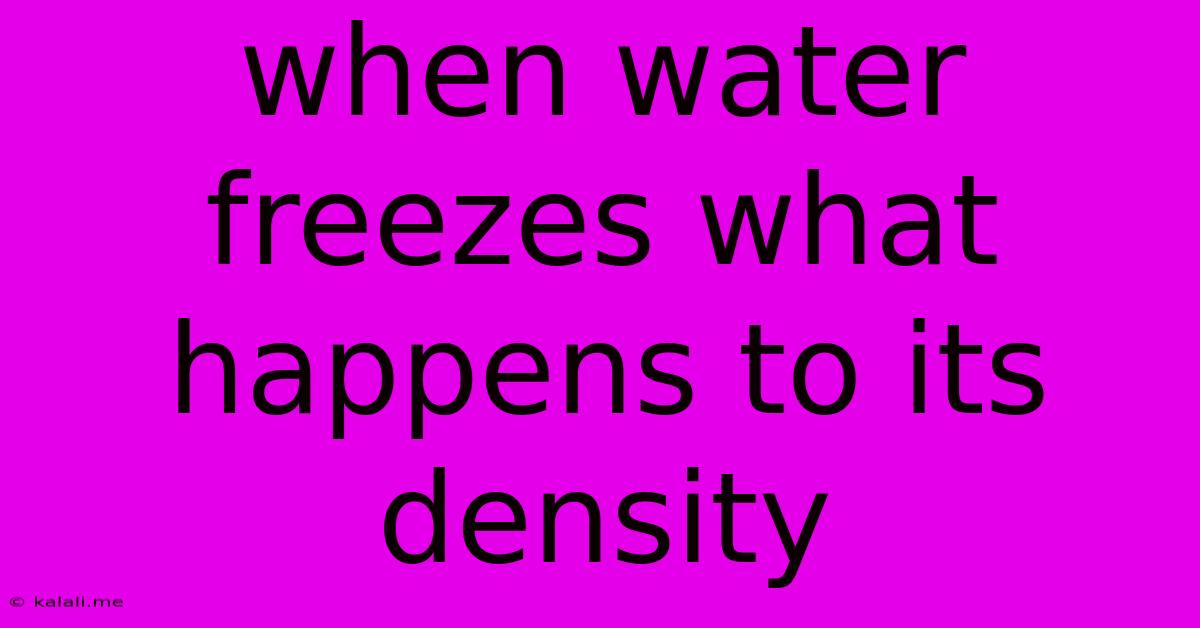When Water Freezes What Happens To Its Density
Kalali
Jun 14, 2025 · 3 min read

Table of Contents
When Water Freezes: The Curious Case of Density Decrease
Water, a seemingly simple substance, exhibits a fascinating anomaly when it transitions from its liquid to solid state. Unlike most materials, water becomes less dense when it freezes, a property with significant implications for life on Earth. This article delves into the microscopic dance of water molecules that explains this unique behavior and its broader consequences.
What happens to the density of water when it freezes? The density of water decreases when it freezes, meaning that ice is less dense than liquid water. This is why ice floats. Most substances become denser as they solidify, but water's unique molecular structure makes it an exception.
The Hydrogen Bond's Crucial Role
The key to understanding this phenomenon lies in the hydrogen bonds formed between water molecules (H₂O). Each water molecule is composed of two hydrogen atoms and one oxygen atom, arranged in a bent shape. The oxygen atom is more electronegative, meaning it attracts electrons more strongly than the hydrogen atoms. This creates a slightly negative charge on the oxygen and slightly positive charges on the hydrogens.
These opposite charges attract each other, forming hydrogen bonds between neighboring water molecules. In liquid water, these bonds are constantly breaking and reforming, allowing molecules to move relatively freely. However, as the temperature drops towards freezing point (0°C or 32°F), the molecules lose kinetic energy and their movement slows.
The Crystal Lattice Formation
At the freezing point, the hydrogen bonds stabilize and arrange themselves into a regular, crystalline structure known as a hexagonal ice lattice. This lattice structure has a significant amount of empty space. The molecules are held further apart in this rigid structure than they are in the more disordered arrangement of liquid water. This increased spacing between the molecules accounts for the lower density of ice compared to liquid water.
Implications of Ice's Lower Density
This seemingly small difference in density has monumental consequences for our planet and life as we know it.
-
Insulation of Aquatic Life: Because ice floats, it forms a layer on the surface of bodies of water during winter. This layer of ice acts as an insulating blanket, preventing the water below from freezing completely. This allows aquatic life to survive even in frigid temperatures. Without this property, bodies of water would freeze solid from the bottom up, eliminating aquatic habitats.
-
Global Climate Regulation: The floating ice also plays a crucial role in regulating Earth's climate. The ice's reflective properties (albedo) help to reflect sunlight back into space, influencing temperature patterns. Changes in the extent of sea ice and glaciers have significant implications for global climate change.
-
Erosion and Weathering: The expansion of water upon freezing is a powerful force, capable of causing physical weathering of rocks and contributing to erosion. This process plays a crucial role in shaping landscapes over geological timescales.
In Summary
The decrease in water's density upon freezing is a direct result of the unique arrangement of water molecules within the crystalline ice structure. This seemingly simple anomaly has profound implications for various natural processes, significantly impacting our planet's climate and the sustenance of life. Understanding this unusual property is vital for comprehending numerous natural phenomena, from the survival of aquatic ecosystems to the shaping of our planet's surface.
Latest Posts
Latest Posts
-
How Many Valence Electrons Do Semiconductors Have
Jun 15, 2025
-
All Of The Following Are Examples Of Video Conferencing Systems Except
Jun 15, 2025
-
Lcm Of 7 4 And 3
Jun 15, 2025
-
Gpa Requirements For Stony Brook University
Jun 15, 2025
-
Which Of Daltons Postulates Were Incorrect
Jun 15, 2025
Related Post
Thank you for visiting our website which covers about When Water Freezes What Happens To Its Density . We hope the information provided has been useful to you. Feel free to contact us if you have any questions or need further assistance. See you next time and don't miss to bookmark.